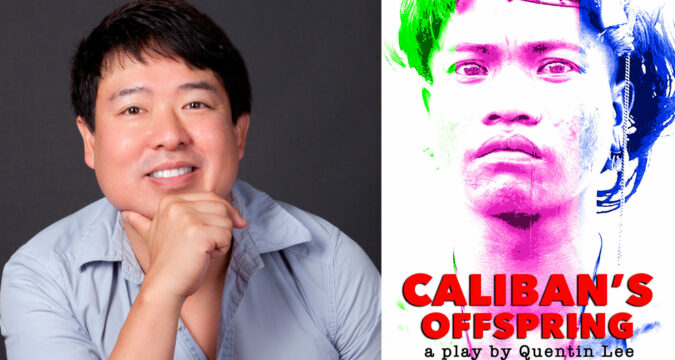
On the eve of publishing his first play, multi-hyphenate creator Quentin Lee talked to CHOPSO about writing and getting his debut play Caliban’s Offspring to the world as a book, sold exclusively on Amazon.com.
I know you more as a producer and director, and screenwriter… tell us why you decided to write a play?
QL: Before I became a filmmaker, in high school, back in the 80s, I started off as a playwright and director. I wrote, directed and produced three plays in high school. In college at Berkeley, I wrote two plays, one was titled Between Sisters that I produced first at the Montreal Fringe Festival and then later at Yale the Heritage Theater Ensemble, a Black theater troop, produced it in 1993. Caliban’s Offspring was actually my Special Project thesis I wrote in my last year at Berkeley with late professor Alfred Arteaga, who was a poet and a Shakespeare scholar. Even though I was already writing an Honors English thesis, I really wanted to write something creative before graduating and hence I decided to write a new Shakespearean play in iambic pentameter based on the characters of Shakespeare’s The Tempest, especially Caliban whom I identified with.
I still don’t hear why you suddenly decided to write a Shakespeare play? Is it a full-length play?
QL: Sorry as it has been like over 30 years… LOL! At Berkeley I took an Upper Division Seminar with the late Janet Adelman, a feminist Shakespeare scholar who inspired me to look at Shakespeare from a feminist and post-colonial perspective. “Is Shakespeare sexist?” asked Janet. “Yes. But why do we study him? Because if there were one man who bashed women the best out of his generation, it was William Shakespeare.” Totally inspired by Janet, I wanted to rewrite The Tempest from Caliban’s point-of-view, and enlisted Alfred Artega, who was a post-colonial Shakespeare scholar and poet, to supervise me on this creative endeavor. Yes, Caliban’s Offspring is a full-length Shakespearean play in five acts.
Tell us more about Caliban, who has inspired you to write Caliban’s Offspring?
QL: Caliban was seen as a villain in The Tempest for a long time, very much like Edmund, the “bastard” child in King Lear. It wasn’t until postcolonial criticism started by Edward Said’s Orientalism in the 70s that people started to critique Prospero as the colonialist and Caliban as the subject of resistance. Of course, coming into The Tempest centuries later as a young BIPOC person in America, you really couldn’t not identify with Caliban, whether you’re Indigenous or a person of color. Caliban represents the strives of Indigenous people in North America and also colonized people in India, the Philippines and even Hong Kong, the former British colony where I was born grew up. I was fascinated by Mamillius who died in The Winter’s Tale so I decided to bring him back as Caliban’s offspring, the titular character, and also turning Mamillius into a queer intersex child that challenges the gender and sexual politics of Prospero’s world.
Having been a queer API person of color in North America from late 80s to now, I’ve really seen the evolution of critique and discourse against canonical literature and the explosion of culture of our own in a very Virginia Woolf way. Just recently, it wasn’t until five decades later, after her death, that Sacheen Littlefeather’s critique of Hollywood gained mainstream approval.
It’s insane!
How come it took you so long to decide to publish the play?
Honestly, about a couple months ago, I randomly wondered what happened to Professor Arteaga and started Googling him… finding out that he passed away in 2008. And I remembered I wrote this Shakespearean play under his tutelage, graduated and never thought much about it. I dug it up from an old Microsoft Word file from 1992 that I needed to use TextEdit to open. I couldn’t remember much about it so I read it and was shocked to realize how relevant it was now…. not just in regards to current racial and postcolonial issues but also current queer and gender politics. I started rewriting and editing it, and decided to publish it in its original form. As an independent filmmaker, I am so over the submission process to major publishers. If I can make an indie film from scratch, why can’t I publish a book myself. I have faith that good content will be discovered in this digital age.
I agree with you that the internet has radicalized our way of disseminating and consuming content… and I’m personally frustrated with the old school publishing world.
Exactly, whether it’s Hollywood or the old school publishing system, the internet has really given it for a run for their money… or audience. I don’t think there is a better time to be an indie filmmaker or a self-publishing writer now. I learned that from Simon Tam, founder of The Slants, who started his own publisher to publish Slanted: How an Asian American Troublemaker Took on Supreme Court. In fact, he also published my first novel The Secret Diary of Edward Ng. So I’m following suit to publish Caliban’s Offspring which I still believe is a bit over the head of traditional publishers or theater production companies. I love reading Shakespeare plays; and hence there has to be an audience / readership for Caliban’s Offspring, which is a play I also enjoy reading.
Purchase a Kindle or Paperback copy of Caliban’s Offspring on Amazon now!

